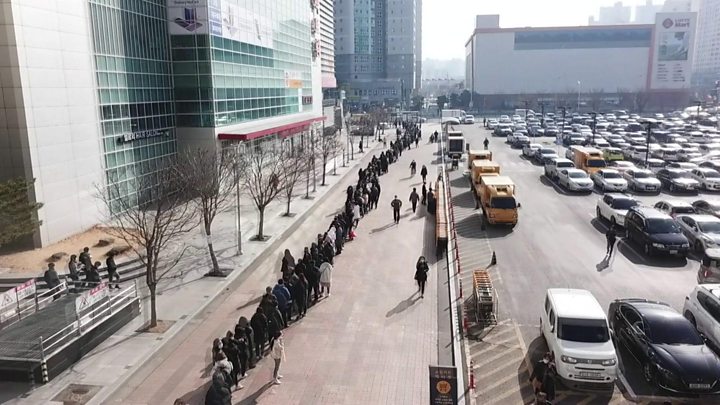
Drone captures massive queue for masks in South Korea's Daegu city
The worst-hit countries are intensifying their efforts to contain the deadly coronavirus as the number of cases globally surpassed 80,000.
In South Korea, officials want to check 250,000 members of a sect identified as a hotbed for spreading the virus.
In China, where more than 2,600 people have died, scientists are reported to have developed an oral vaccine and are hoping to conduct clinical trials.
In Japan shares slumped on Tuesday amid fears the virus could spread further.
This followed a global stock market plunge with Wall Street and London suffering big drops.
The World Health Organization said on Monday the world should do more to prepare for a possible pandemic. The WHO said it was too early to call the outbreak a pandemic but countries should be "in a phase of preparedness".
More cases of the virus, which causes respiratory disease Covid-19, continue to emerge, with outbreaks in South Korea, Italy and Iran causing concern.
The proportion of infected people who die from Covid-19 appears to be between 1% and 2%, although the WHO cautions that the mortality rate is not known yet.
What's the latest from China?
The state-run Global Times reported that a professor at Tianjin University had taken four doses of an oral vaccine with no side effects and believed it could be produced quickly on a large scale.
Experts warn that until full clinical trials have taken place it is unclear how safe or effective the vaccines will be and it could still be months before they can be made widely available.

The Chinese government has announced a ban on the consumption of wild animals and a crackdown on the hunting, transportation and trade of prohibited species, state media say.
It is thought that the outbreak originated at a market in the city of Wuhan, Hubei province, selling wild animals.
China also said it would postpone the annual meeting of the National People's Congress next month, to "continue the efforts" against the coronavirus.
On Monday, the country reported 508 new infections, compared with 409 on Sunday. The bulk of the new cases were in Wuhan.
The death toll in China rose by 71 to 2,663. More than 77,000 people in the country have been infected.
What about other countries?
In South Korea, a ninth person has died after contracting the virus.
Nearly 900 people are confirmed to have been infected across the country. Most of them are members of the secretive religious sect known as the Shincheonji Church of Jesus.
Health authorities have now been given the details of a quarter of a million members of the church to check they have no symptoms of the virus.
Japan on Tuesday urged companies to introduce staggered working hours and teleconferencing to prevent the spread of the virus, the country's NHK broadcaster reported.
Japan has now confirmed more than 850 infected people, most of them on the quarantined Diamond Princess cruise liner.
NHK also reported a fourth death among the ship's passengers.
Italy has the largest number of cases in Europe, 229, and announced a series of drastic measures over the weekend to try to contain the outbreak.
In the regions of Lombardy and Veneto, a lock-down is in place in several small towns. For the next two weeks, 50,000 residents will not be able to leave without special permission.
What did the WHO say?
WHO chief Tedros Adhanom Ghebreyesus told reporters on Monday that the number of new cases in recent days in Iran, Italy and South Korea was "deeply concerning".
However he added: "For the moment we are not witnessing the uncontained global spread of this virus and we are not witnessing large scale severe disease or deaths.
"Does this virus have pandemic potential? Absolutely, it has. Are we there yet? From our assessment, not yet."
"The key message that should give all countries hope, courage and confidence is that this virus can be contained, indeed there are many countries that have done exactly that," Mr Tedros said.
"Using the word 'pandemic' now does not fit the facts but may certainly cause fear."
But Mike Ryan, head of WHO's health emergencies programme, said now was the time to make "do everything you would do to prepare for a pandemic".
What are the symptoms?
The main signs of infection are fever (high temperature) and a cough as well as shortness of breath and breathing difficulties.
What should I do?
Frequent hand washing with soap or gel, avoiding close contact with people who are ill and not touching your eyes, nose and mouth with unwashed hands can help cut the risk of infection.
Catching coughs and sneezes in a tissue, binning it and washing your hands can minimise the risk of spreading disease.
What does 'pandemic' mean?
- A pandemic is the worldwide spread of a new disease
- The H1N1 (swine flu) outbreak, which killed hundreds of thousands of people, was declared a pandemic by the WHO in 2009
- The WHO no longer formally labels an outbreak of disease a "pandemic" but says the term may be used "colloquially"
- Its advice to countries - to limit the infections while preparing for wider spread - remains the same
- Coronavirus: A visual guide to the outbreak
- How a misleading coronavirus map went global
- Watching loved ones die without care in Wuhan
BBC